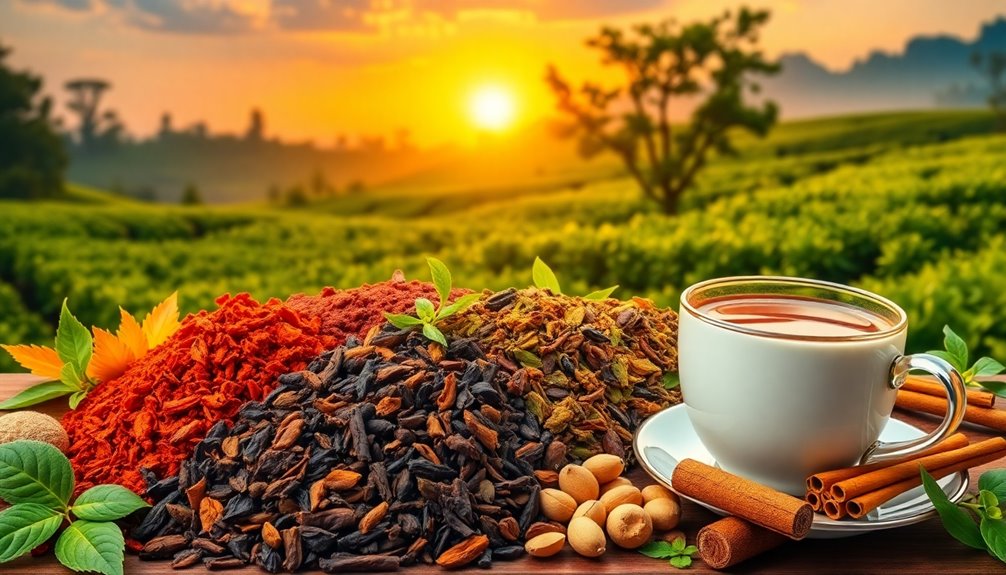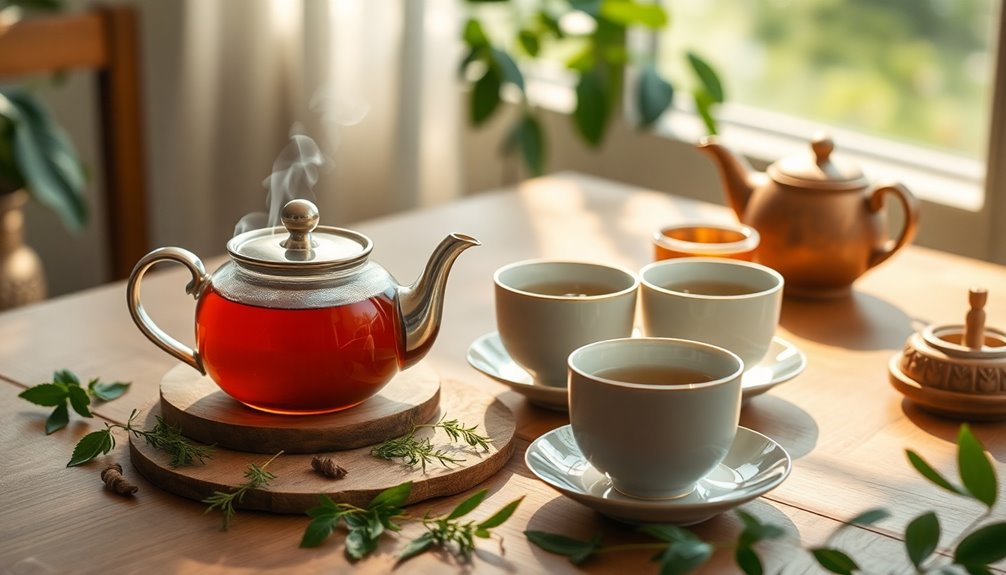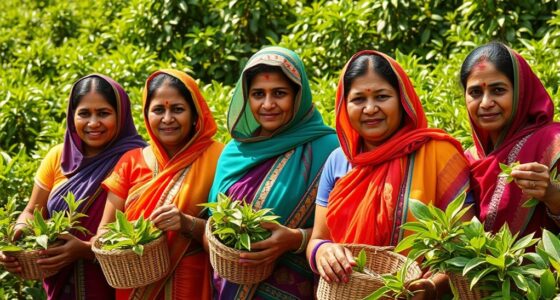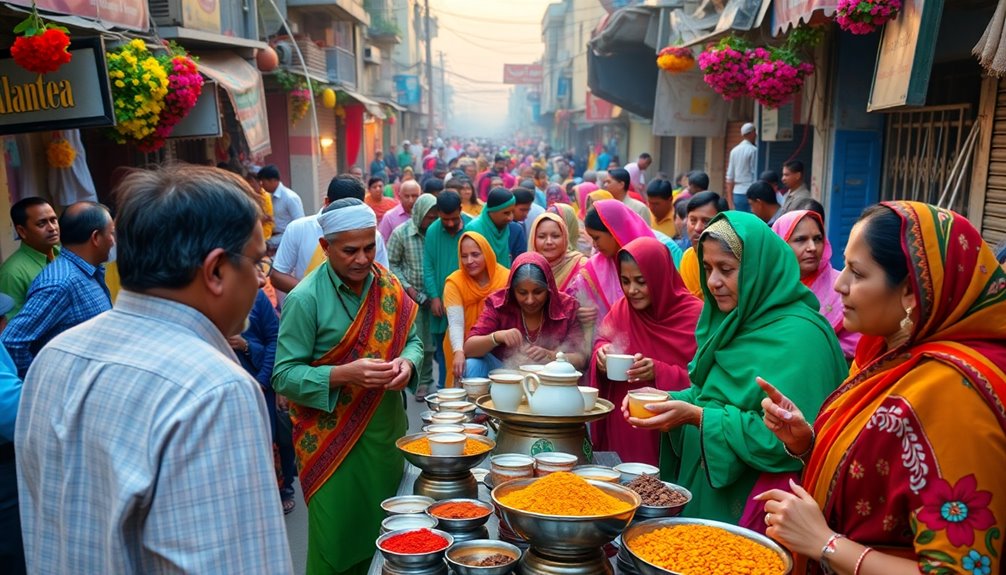If you're looking to elevate your tea collection, start with the exquisite Indian varieties: Darjeeling, Assam, and Nilgiri. Darjeeling, dubbed the "Champagne of Teas," offers delicate aromas perfect for special occasions. Assam boasts robust, malty flavors that shine with milk, making it a go-to for breakfast. For something lighter, Nilgiri's fragrant, floral notes provide a refreshing experience. Each tea carries rich cultural significance and enhances the rituals of daily life. Discovering the unique traits of these teas will enrich your collection. There's so much more to uncover about these delightful brews that awaits you.
Key Takeaways
- Darjeeling Tea: Known as the "Champagne of Teas," it offers delicate aromas and complex flavors, making it a must-have for any collection.
- Assam Tea: Features robust, malty flavors, perfect for enjoying with milk; its strong character appeals to many tea enthusiasts.
- Nilgiri Tea: Provides a lighter, fragrant experience with floral notes, ideal for those seeking a refreshing cup.
- Masala Chai: A cultural staple, this spiced tea blend adds warmth and rich flavors to your collection, enhancing family bonding moments.
- Kashmiri Chai: Popular during winter festivities, its unique preparation and vibrant color make it a delightful addition to any tea assortment.
Introduction
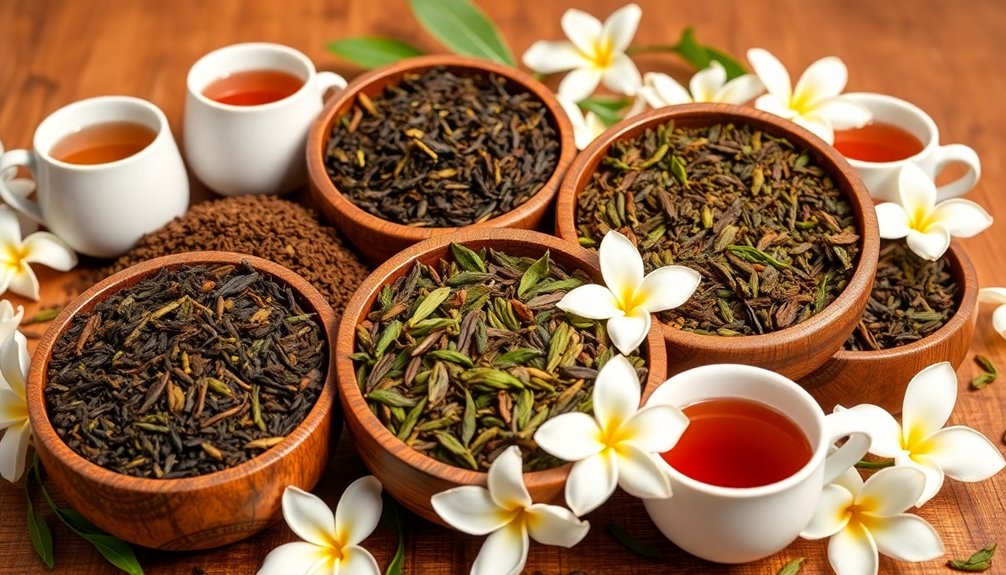
Tea is more than just a beverage in India; it's a cultural experience steeped in tradition and diversity. When you delve into Indian teas, you'll discover a world rich in flavors and aromas. The renowned varieties such as Darjeeling, Assam, and Nilgiri each bring unique characteristics shaped by their growing regions.
Darjeeling, often dubbed the "Champagne of Teas," is perfect for those who appreciate delicate aromas and complex flavors that shine best without milk.
On the other hand, Assam tea offers a robust, malty flavor profile that's typically enjoyed with milk and sugar, making it a breakfast staple for many. If you're looking for something lighter, Nilgiri tea can be your go-to, with its fragrant aroma and smooth taste that features floral and fruity notes.
These Indian teas not only provide delightful sensory experiences but also come packed with health benefits. Whether you prefer black tea or green tea, exploring the diverse tea culture of India will enrich your collection and elevate your daily rituals.
Cultural Heritage of Indian Tea
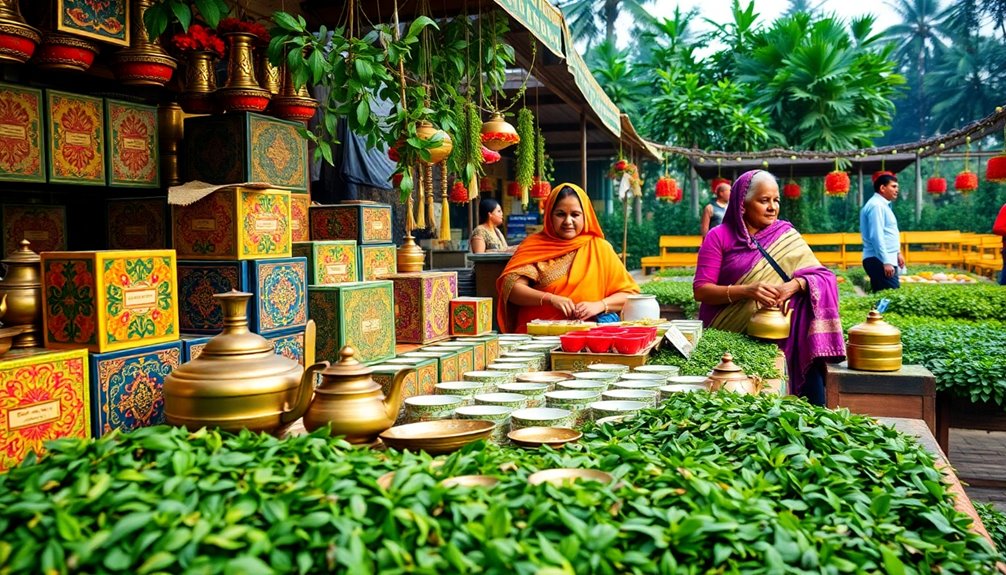
India's rich tapestry of cultural heritage is intricately woven with its tea traditions. Since the early 19th century, tea cultivation blossomed under British colonial influence, aiming to replicate Chinese methods. Today, key regions like Assam and Darjeeling produce teas celebrated for their unique flavor profiles.
Darjeeling tea, often called the "champagne of teas," stands out for its exquisite aroma and high quality, making it a favorite among tea lovers.
The cultural significance of Indian tea extends beyond mere consumption. The preparation of masala chai, a delightful blend of Assam black tea and aromatic spices, showcases the country's love for rich flavors. This everyday beverage serves as a bridge between generations, uniting families and friends over steaming cups.
As you explore the world of Indian tea, you'll discover not just a beverage but a reflection of the country's history and cultural diversity.
With India ranking among the top tea producers globally, its contributions to tea cultivation and cultural heritage are undeniable. Embrace these traditions by adding Indian teas to your collection and savor the stories behind each sip.
Tea's Role in Indian Rituals
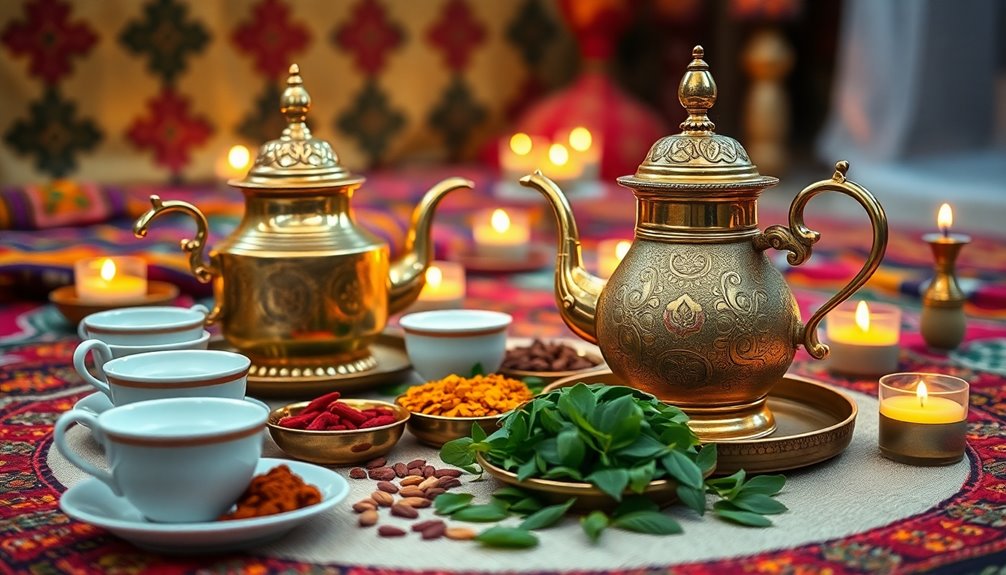
In many Indian homes, a warm cup of tea isn't just a drink—it's a vital part of daily rituals that reflect deep-rooted traditions. When you wake up, the aroma of Masala Chai fills the air, setting a positive tone for the day. This cherished morning ritual isn't just about the tea; it's an opportunity for family bonding, rich in antioxidants and flavor.
Tea also plays a significant role in hospitality. When guests arrive, serving a cup of spiced tea symbolizes warmth and welcome, showcasing the cultural practice of offering a drink. In celebrations like weddings, special tea blends, such as Kashmiri Chai, enhance the festive atmosphere, making these moments memorable.
Moreover, tea rituals extend beyond households. They form a communal activity, bringing neighbors and friends together during gatherings. Sharing a pot of black teas can strengthen social ties and foster a sense of belonging.
In various spiritual practices, offerings of tea to deities symbolize devotion and gratitude, further embedding tea into the fabric of Indian life. Embracing these tea rituals enriches your tea experience and connects you to India's vibrant culture.
Tea in Indian Festivals
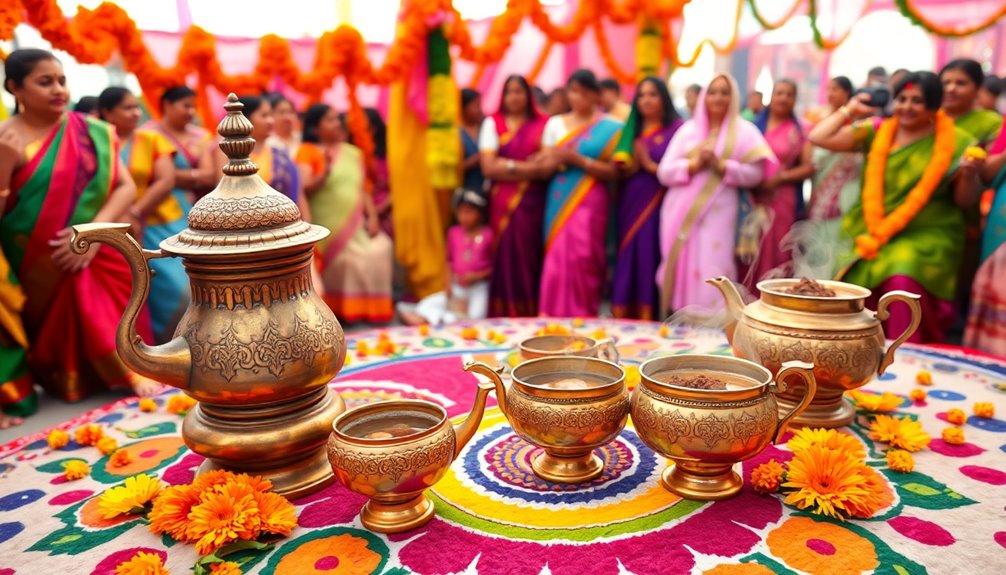
During festivals, the aroma of freshly brewed chai fills homes, creating an inviting atmosphere that enhances celebrations. Tea isn't just a beverage; it symbolizes hospitality and community.
Take Diwali, for instance, where families serve rich masala chai to guests, blending black teas with spices for a warm welcome.
During Holi, vibrant herbal teas infused with floral notes uplift the festive spirit, adding color to the occasion. You might notice that in many South Indian regions, traditional filter coffee gets swapped for masala chai during the festival season, showcasing tea's versatility.
Kashmiri Chai, known for its unique pink hue and creamy texture, becomes a favorite during winter festivals like Eid. This delightful tea represents warmth and togetherness, perfect for family gatherings.
Special tea ceremonies often feature luxurious blends, such as Saffron Chai, elevating your celebrations with high-quality ingredients. Additionally, the traditional tea ceremony emphasizes mindfulness and respect, making the act of serving tea a cherished ritual during these festive occasions.
Don't forget about Darjeeling green teas, which also add sophistication to your festive table.
Market Competition and Pricing
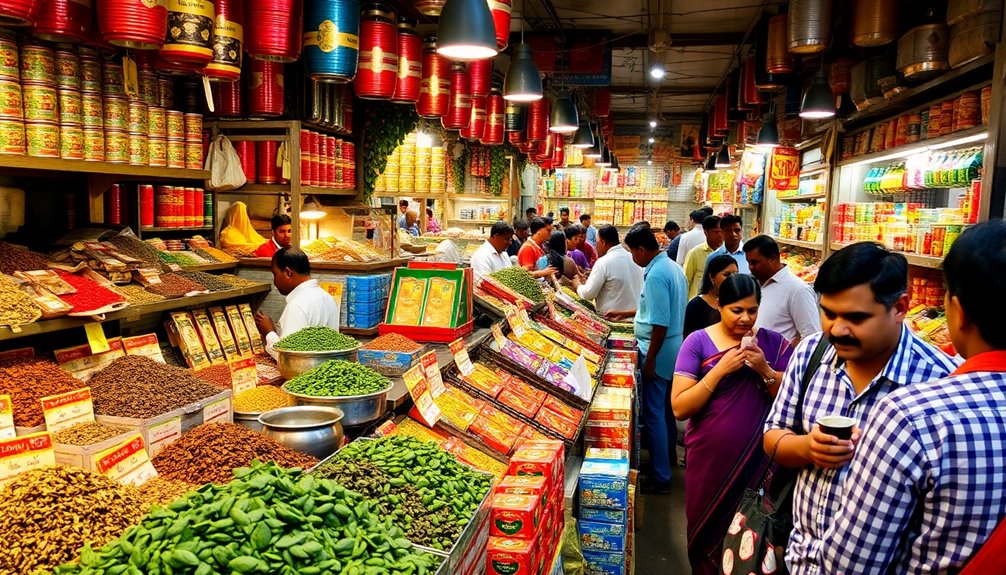
The Indian tea market buzzes with competition, featuring notable regions like Assam, Darjeeling, and Nilgiri, each bringing unique flavors and qualities to the table.
When you explore premium Indian teas, you'll find that specialties like Darjeeling First Flush often command higher pricing due to their limited harvests and labor-intensive cultivation methods. These teas aren't just a treat but an investment in quality.
For everyday enjoyment, quality loose-leaf Indian teas typically range from $2.40 to $3.20 per serving, making them an affordable luxury that you can easily indulge in.
Whether you prefer tea bags or loose leaf, there's something for every tea enthusiast. Online retailers enhance this experience with competitive pricing and promotions, showcasing popular teas that frequently rank high on platforms like Amazon.
As you consider your options, keep in mind that sustainability practices and ethical sourcing are increasingly important to consumers.
Brands that prioritize these values often differentiate themselves in the market, influencing their pricing.
Ultimately, understanding the landscape of Indian teas not only helps you find the best tea for your collection but also aligns your choices with your values.
Practical Applications

Exploring the practical applications of Indian teas can enhance your daily routine in delightful ways. Start your day with a robust cup of Assam Tea, known for its strong, malty flavor. It pairs beautifully with milk and sugar, making it the perfect breakfast blend.
For a refined afternoon, indulge in Nilgiri Tea, which offers a fragrant aroma and smooth taste with floral and fruity hints. This tea adds a touch of elegance to your tea assortment.
When you seek something unique, try the luxurious Darjeeling Tea, especially the Premium Darjeeling from the second flush. Its distinct floral and fruity flavors shine best without milk, providing a refreshing experience.
Meanwhile, for festive occasions, Kashmiri Chai will impress with its creamy texture and vibrant pink color, enhanced by spices and nuts.
Don't forget to include wellness teas in your collection, like the Cleansing Golden Turmeric Latte. These teas offer health benefits such as immune support and digestive wellness, making them ideal for any time of day.
Conclusion
Incorporating Indian teas into your collection not only enriches your palate but also connects you to the deep cultural heritage of India. From everyday rituals to festive celebrations, each tea tells a unique story. As you explore the diverse flavors and blends available, you'll appreciate the vibrant market that continues to thrive. So, whether you savor a cup alone or share it with friends, these teas will surely elevate your experience and bring joy to your tea time.

